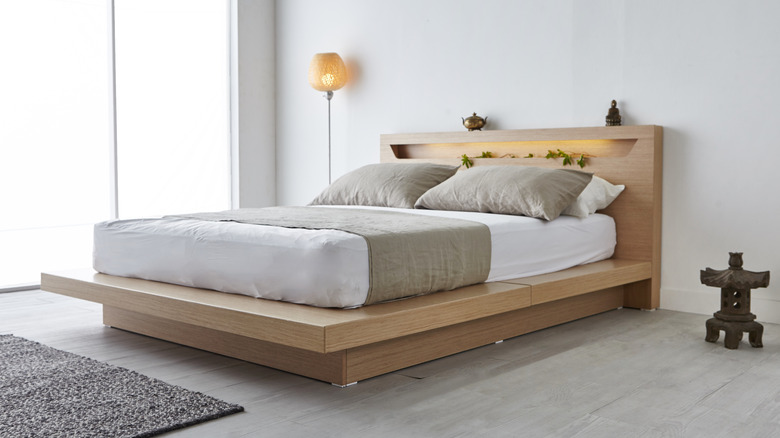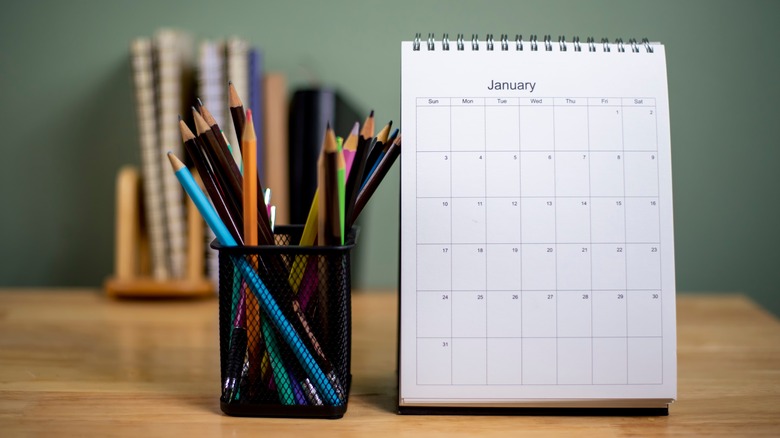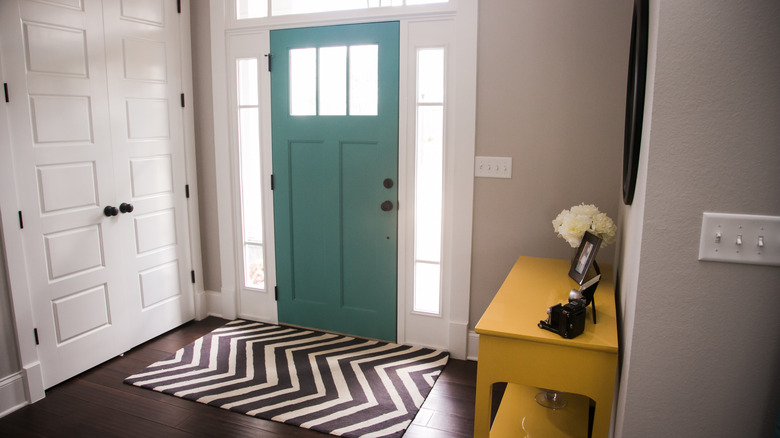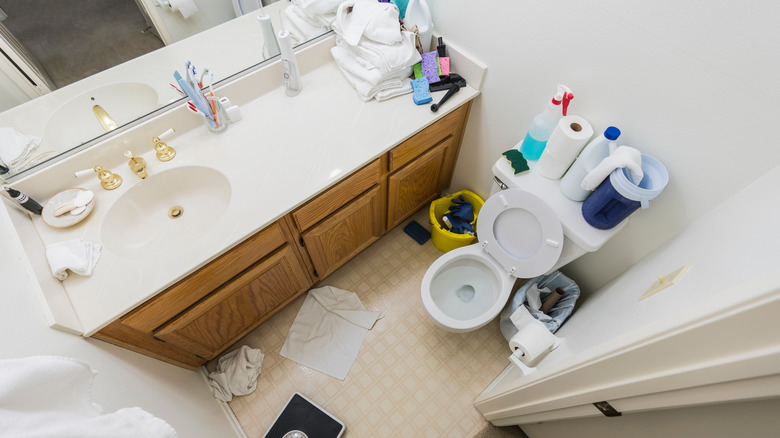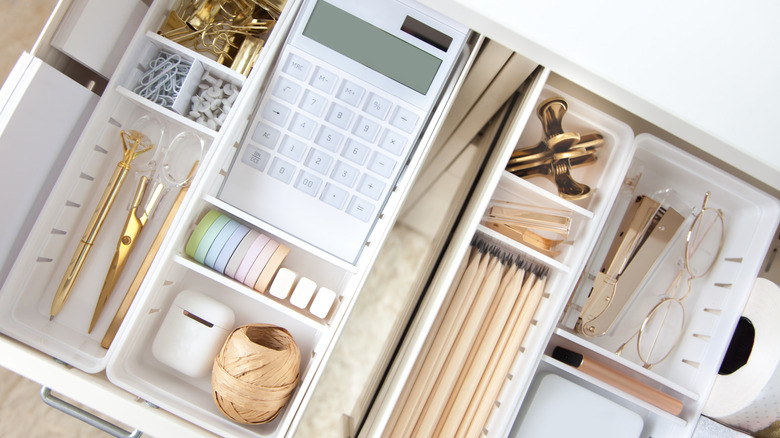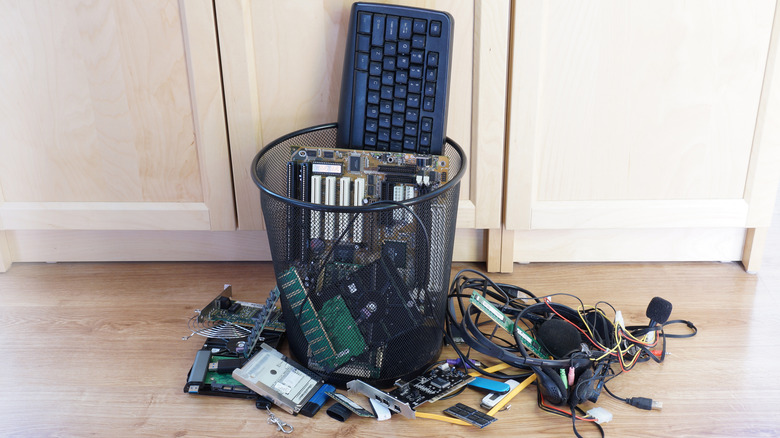How To Declutter Your Home Using Feng Shui
We may receive a commission on purchases made from links.
Clutter is common. Even the most organized, minimalist individual has dealt with it at one point in their lives, whether it be an everyday occurrence or a more sporadic experience. But clutter isn't just unsightly, writes Very Well Mind, and being constantly exposed to clutter and chaos, no matter how minimal, can seriously affect your mental well-being. Luckily, there's feng shui, says the health publication – an ancient Chinese art of arranging items in your dwelling so that the energy flowing through brings you positive and harmonious feelings.
Feng shui means wind-water, which refers to how energy (called chi, per Mind Body Green) flows through your home, just like a river moves through its natural environment. Feng Shui Pathway states that clutter can make the chi in your home stagnant, and this slow-moving energy will ultimately negatively impact your overall health and well-being. For example, if you dam up a river, it can seriously damage its surroundings. Now, apply that concept to the clutter in your home. That said, there are a few simple clutter-clearing feng shui fundamentals to work with when decluttering your humble abode. Because let's face it: Funky vibes have no place in your home.
Start with a plan
Rome wasn't built in a day, so if you've got more clutter than you thought or are easily overwhelmed by any amount of disorganization, it's best not to look at the big picture, notes the clutter-clearing blog, Becoming Minimalist. Take things one at a time. The first thing to do is make a schedule and stick to it, and don't try to bite off more than you can chew. Creating a cleaning schedule where you're going at it for days in a row or multiple hours a day (or both) will make you less productive on your clutter-clearing quest, via Decluttering School. Plan to Organize says that time blocking can also help you get the most out of your day, so don't forget to incorporate this tool.
After you've figured out your decluttering days, you'll need to choose what to tackle first. Ideally, it would be best if you spent the most time in areas of your home or your front and back entryways. Once you've chosen your particular spot, you'll break that space into smaller, more approachable sections. For example, focusing on your bedroom closet instead of the entire bedroom is much easier to tackle and less intimidating. If you were eating a steak, you wouldn't shove the whole thing into your mouth all at once, right? Of course not. You would cut it into smaller, more manageable morsels. It's the same idea, just a different application.
Clear your front door area and entryway
The front door is the most crucial part of your home, via World of Feng Shui, because it gives you a sense of how your day will go and end. (It's pretty much giving us a first impression.) Naturally, whether inside or outside, if there's chaos waiting for you when you come home, you will feel it no matter what. While you can't fully control what makes a desirable "feng shui'd" building layout, you can control what you place and where. LoveToKnow says that outerwear, shoes, and other items typically discarded on the floor as soon as you come home should be put in a hallway closet. Shoes, in particular, should be placed inside a cabinet that closes, and they should never be left outside because it symbolizes that you're ready to go just as soon as you've arrived.
Homedit warns that displaying personal items like family photos is a big no-no because these are personal and should be put in areas with low traffic, not exposed to the outside world. Make sure the pathway is clear of knickknacks and unnecessary items, like footstools. The last thing you want is your chi to get all tripped up on that cute basket you keep out for wet umbrellas, even when it's not the rainy season.
There's a general rule for each room
There are a few nonnegotiables regarding feng shui, decluttering, and the rooms of your abode, notes Everyday Health. Your bedroom, for example, is for sleeping and passion play, and that's it. Laundry should be put away, wall art and flat spaces should be cleared of messiness, and outside distractions should be nonexistent. If there's anything under your bed, it needs to be stored elsewhere, says RealLiving. The chi needs to be able to flow freely right underneath your box spring. And wouldn't it be great if chi could sweep up those dust bunnies?
If you find yourself holding on to unopened toothpaste, lotions, and other toiletries that also happen to be expired, just let them go, writes The Minimalists. Investing in smart under-sink storage for both the bathroom and kitchen is beneficial. Just like the bedroom, the chi should be able to flow right under your other furniture pieces. Too much wall art or too much visual can provoke severe anxiety, per HuffPost. When addressing any room, if you see something that doesn't sit right with you or makes you feel uneasy, remove it promptly. Chances are that the item is blocking the natural flow of your home and needs to be dealt with immediately.
Make sure everything has a home
According to the organizational blog Sarah Ever After, the best habit you can put into practice right this second is to start putting things back where you found them. It's almost like a fundamental rule for successful clutter busting. But what are you supposed to do if your items don't have a designated place to live? That's where the KonMari Method comes into play. It might not seem like this organizational method, popularized by clutter-clearing guru, Marie Kondo, has anything to do with feng shui. On the contrary. Liu Feng Shui, a self-proclaimed organizer geek, compares the two philosophies and notes that they both promote surrounding yourself with things that bring in good energy and removing items that do just the opposite.
One of the six main clutter-cutting principles of the KonMari Method is that everything has a home, via KonMari. If you currently don't have a designated spot for your trinkets, then it's time you make one. There is a second part to this rule, and it's a much simpler task to complete when you compare it to permanently rehoming your curios. You'll need to train yourself not to fall into old patterns and instead put your baubles in their newly designated living spaces. It's a sign of respect for these happiness-inducing items. In return, those positive vibes boost your chi, ultimately benefiting the household.
Clear out things that don't serve you anymore
According to Elegant Simplicity, there are more than a few reasons why we hold on to random objects, knickknacks, and clutter. It boils down to having an emotional bond to each item you refuse to let go of, per Motherly. You could have received something as a gift and would feel guilty if you gave it away. It might also be an inheritance, or the particular item might evoke strong memories of a person, place, or life event. Whatever the reason, it's tough to let go of stuff. But it's also therapeutic and raises your vibration.
Once you sit down and decide to tackle your clutter, ask yourself if each item makes you genuinely happy. The KonMari Method calls it "mindful discarding." If it doesn't induce joy, thank it for serving its purpose and set it aside for donation. By donating your belongings, you're potentially making someone happy and giving your item a new life, which boosts your energy. On the flip side, if you're holding onto broken things, like that super cool lava lamp that doesn't flow like it used to, then it's most definitely time to part ways. If it reminds you of something sad or negative, toss it. After all, the ultimate goal here is to bring more happiness into your life.
